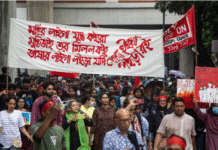
Abdul Bayes : INFLATION is said to be the most universal tax of all, destroying savings, impeding planning, and discouraging investment. In consequence, inflation means less productivity and a lower standard of living.
Bangladesh has been witnessing high inflation for a pretty long time, initially fuelled by the Covid pandemic but later on flamed by the Ukraine-Russia war that, allegedly, disrupted the supply chain of food and agricultural raw materials. A group of economists, however, tend to argue that the wrong domestic policies to contain inflation worsened the situation. For example, even government statistics reveal that food inflation in Bangladesh stayed above 12 per cent for the second consecutive month in September; prices showed no signs of cooling down, hitting the pockets of consumers who spend roughly 60 per cent of their budget on food and 35 per cent on rice alone. According to the data released by the Bangladesh Bureau of Statistics, ‘food inflation stood at 12.37 per cent last month, slightly down from August’s 12.54 per cent but nearly three percentage points higher from the rate seen in the identical month a year prior’. Non-food inflation also fell, to 7.82 per cent, which was 7.95 per cent in August. A recent surge in inflation eroded consumer purchasing power, contributing to a deceleration in estimated private consumption from 7.5 per cent to 3.5 per cent, according to the World Bank.
By and large, in Bangladesh, inflation has accelerated in the past year and a half owing to a mixture of external and internal factors. ‘External factors include supply chain disruptions following Russia’s invasion of Ukraine and higher international commodity prices, while domestic factors include a 28 per cent depreciation of the taka against the US dollar since February last year and persistent foreign currency shortages, driven by a 30 per cent drop in the reserve, leading to import restrictions’.
The World Bank, in a recent reaction, disclosed a 179 per cent hike in the administered gas for the industrial sector, coupled with an increase in administered electricity prices, leading to higher prices for manufactured products. Ipso facto, higher administered diesel prices affected irrigation and the prices of agricultural products. More than 40 per cent increase in the administered prices of petroleum products in the domestic market impacted transportation costs, which, in turn, affected retail prices.
It is worth noting that different countries of the world tamed their high inflation through prudent monetary and fiscal policies, and neighbouring countries like India and Sri Lanka reigned on inflation with so much sagacity that the inflation rate in those countries now hovers around 6–7 per cent from its peak of 40–50 per cent even a year ago.
Monetary and fiscal policies in Bangladesh, especially the monetary instruments used by the Bangladesh Bank, miserably failed to control the menace. We reckon that the best policy to bring down double-digit inflation is to raise the interest rate. Macroeconomic theory suggests that, to contain aggregate demand, a rise in interest rates serves as medicine to cure the illness. However, business and industrial groups allegedly put pressure against such a rise in interest rate on the plea that that would discourage domestic private investment. Of course, there is some meat in their arguments, as the rise in the cost of borrowed capital could impinge on investment when the two variables are inversely related. And since the business and industrial communities are well organised and control the power structure, while consumers are not organised and only to fret, the consumer surplus dwindles and the producer surplus increases.
One might be tempted to argue that, first, even when the interest rate was capped at 6/9 to help businessmen invest more, there is no evidence that Bangladesh was flooded with investment; in fact, private investment stagnated as alleged. Second, a hike in the interest rate is being prescribed for the short term until the inflation rate falls to 6–7 per cent, after which an expansionary monetary policy could be taken to boost investment. In fact, the argument could be stretched out to the point where big loans should be reduced while loans to small traders and industries could be increased, thus serving both ends — growth and consumers’ comfort. Third, investment, or for that matter, economic growth, in a country does not depend on the ‘businessmen-friendly, environment; rather, it works well in a ‘business-friendly’ environment. The former consists of various rebates, concessions and incentives paid to investors for encouragement, while the latter indicates a regime where proper credible policies, better infrastructure, an educated labour force, and favourable monetary and fiscal policies help businesses across the board — even those outside Chamber houses.
Over the years, policymakers have appeared to appease our business and industrial communities through generous concessions without paying proper heed to the overall business environment. A classic example in this case is the incentive for RMG exporters who have been reaping this reward since the beginning of the industry, spanning over 40 years or so! A business-friendly policy would help diversify the economy.
To cut a long story short, we suggest that Bangladesh Bank should immediately take steps to attract consumers to saving rather than consumption. That will reduce inflation, although temporarily, at the cost of a marginal fall in investment and growth. People’s sufferings are more important than other things. Growth is for the people, not the other way round.
Footnote: ‘Adam Smith denounced the incestuous marriage between the monarchies and the merchants of Europe. In a famous statement, Smith warned that businessmen seldom meet without plotting against the consumer. One of the few things Adam Smith, Karl Marx and Thorstein Veblen had in common was their realisation that businessmen love to use politics in order to help themselves’ — (Todd G Buchholz, New Ideas from Dead Economists).
Abdul Bayes, a former professor of economics and vice-chancellor, Jahangirnagar University, is now an adjunct faculty at East West University. ( New Age)









